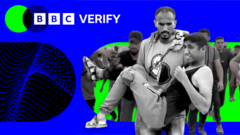What’s Behind This Awkward Hat-Trick of U-Turns?

Understanding the Political Landscape: U-Turns, Governance, and Implications for the Future
In the dynamic world of politics, decisions are often made under pressure, and sometimes those decisions require a swift reversal. The recent U-turns by the government have sparked intense discussions about the implications for leadership, public trust, and the welfare state. This article delves into the recent political reversals faced by the government, particularly focusing on the winter fuel payment, the inquiry into grooming gangs, and the latest developments regarding benefits. By exploring the motivations behind these changes and their potential consequences, we can gain a clearer understanding of the current political landscape.
The Context of Political U-Turns
Political U-turns are not uncommon, especially in environments where public sentiment can shift rapidly. The recent decisions by the government are indicative of a wider struggle to maintain authority and public confidence. Understanding the reasons behind these changes provides insight into how governance operates in the current political climate.
Recent Government U-Turns
Three significant U-turns in a short span have drawn attention to the government’s decision-making process:
- Winter Fuel Payment Revisions: Initially, the government proposed changes to the winter fuel payment scheme, which would have impacted millions of pensioners. However, faced with backlash from the public and opposition parties, they reversed their decision.
- Inquiry into Grooming Gangs: The government’s initial stance was that a statutory inquiry into grooming gangs was unnecessary. However, after considerable pressure from various stakeholders, they opted for an investigation, indicating a shift in their approach to sensitive social issues.
- Welfare State Adjustments: The latest U-turn regarding benefits reflects a significant alteration in policy that arose from internal dissent and public outcry. The government was compelled to reconsider its stance to avoid political fallout.
Political Pressure and Public Sentiment
The political landscape is heavily influenced by public sentiment, and the government’s recent decisions underscore this reality. The backlash against proposed changes to benefits and welfare provisions reveals how important it is for politicians to listen to their constituents.
Labour's Reaction
Labour leader Sir Keir Starmer faced significant challenges during this time. Reports indicate that many Labour MPs were dissatisfied with the government's approach to welfare policy. Their organized dissent signals a deeper concern within the party about how these changes could affect their standing with voters.
Key Takeaways from Labour's Response:
- Internal dissent within Labour suggests a disconnect between party leadership and grassroots sentiments.
- The ability of party members to mobilize against unpopular policies showcases the importance of party unity and communication.
- Starmer's leadership is being tested as he navigates the complexities of maintaining party cohesion while opposing government decisions.
Government's Justifications for U-Turns
In response to the political pressure and evolving public opinion, government officials have provided justifications for their U-turns. They argue that decisions were made based on careful consideration and the necessity of adapting to changing circumstances.
Pragmatism vs. Popularity
Ministers contend that their approach was pragmatic, aimed at addressing pressing issues such as rising benefits bills and the sustainability of the welfare state. They believe that limiting the growth of welfare expenditures is essential for long-term economic stability. However, the challenge lies in balancing fiscal responsibility with the need to uphold public trust and support for social programs.
Implications of the U-Turns
Each U-turn carries potential ramifications for the government’s credibility and future policy-making:
- Economic Competence: The government's ability to project economic competence is central to its public image. Frequent reversals may undermine confidence in their financial stewardship.
- Public Trust: U-turns can erode public trust, especially when they appear to stem from political pressure rather than genuine concern for constituents' needs.
- Leadership Authority: The authority of the Prime Minister is called into question when the government appears to be reactive rather than proactive in its decision-making.
The Future of Welfare Policy
The future of welfare policy in light of these recent changes remains uncertain. As the government grapples with rising benefits costs, it must navigate the pressures of public opinion while ensuring that vulnerable populations receive the support they need.
Potential Directions for Policy
Several pathways could emerge from the current situation:
- Enhanced Communication: The government may need to prioritize transparent communication with the public regarding welfare policies and the rationale behind any changes.
- Increased Engagement with Stakeholders: Engaging with various stakeholders, including community organizations and advocacy groups, can lead to more informed and acceptable policy decisions.
- Focus on Sustainable Solutions: Developing long-term solutions that address the root causes of welfare dependency may be necessary to alleviate pressures on the benefits system.
Conclusion: The Road Ahead for Governance
In conclusion, the recent U-turns by the government highlight the delicate balance between political decision-making and public sentiment. As leaders navigate these challenges, the importance of understanding constituents’ needs becomes paramount. The future of welfare policy will likely depend on the government’s ability to adapt and respond effectively to the evolving landscape of public opinion.
As we observe the unfolding political drama, one question remains: How will the government rebuild trust and credibility in the wake of these significant policy reversals? The journey ahead will undoubtedly shape the political narrative for years to come.
FAQs
What are the key reasons behind recent government U-turns?
Recent U-turns stem from political pressure, public dissent, and the need to adapt to changing circumstances regarding welfare policy and other social issues.
How does public sentiment affect government decision-making?
Public sentiment plays a crucial role in shaping government policies. When constituents express dissatisfaction, it can lead to rapid policy reversals to maintain public trust.
What are the implications of U-turns for political leadership?
U-turns can undermine a leader's authority and credibility, especially if they appear reactive rather than proactive. It may lead to challenges in maintaining party unity and public confidence.
As we reflect on these developments, it’s clear that the political landscape is ever-evolving. How do you think the government should address public concerns while maintaining fiscal responsibility? #Politics #Welfare #Governance
Published: 2025-06-27 06:39:04 | Category: technology



